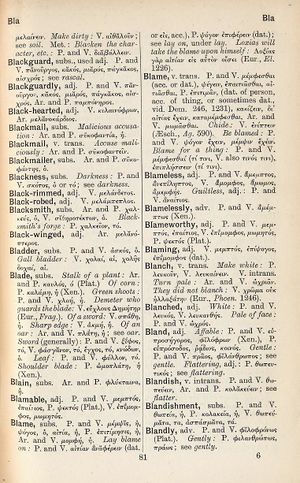blame
ὦ δυσπάλαιστον γῆρας, ὡς μισῶ σ' ἔχων, μισῶ δ' ὅσοι χρῄζουσιν ἐκτείνειν βίον, βρωτοῖσι καὶ ποτοῖσι καὶ μαγεύμασι παρεκτρέποντες ὀχετὸν ὥστε μὴ θανεῖν: οὓς χρῆν, ἐπειδὰν μηδὲν ὠφελῶσι γῆν, θανόντας ἔρρειν κἀκποδὼν εἶναι νέοις → Old age, resistless foe, how do I loathe your presence! Them too I loathe, whoever desire to lengthen out the span of life, seeking to turn the tide of death aside by food and drink and magic spells; those whom death should take away to leave the young their place, when they no more can benefit the world
English > Greek (Woodhouse)
subs.
P. and V. μέμψις, ἡ, ψόγος, ὁ, αἰτία, ἡ, P. ἐπιτίμησις, ἡ, Ar. and V. μομφή, ἡ.
Lay blame on: P. and V. αἰτίαν ἀναφέρειν (dat. or εἰς, acc.), P. ψόγον ἐπιφέρειν (dat.); see lay on, under lay.
Loxias will take the blame upon himself: Λοξίας γὰρ αἰτίαν εἰς αὑτὸν οἴσει (Eur., El. 1226).
v. trans.
P. and V. μέμφεσθαι (acc. or dat.), ψέγειν, ἐπαιτιᾶσθαι, αἰτιᾶσθαι, P. ἐπιτιμᾶν, (dat. of person, acc. of thing, or sometimes dat., vid. Dem. 246, 1231), κακίζειν, διʼ αἰτίας ἔχειν, καταμέμφεσθαι, Ar. and V. μωμᾶσθαι.
Chide: V. ἐνίπτειν (Aesch., Ag. 590).
Be blamed: P. and V. ψόγον ἔχειν, μέμψιν ἔχειν.
Blame for a thing: P. and V. μέμφεσθαί (τί τινι, V. also τινός τινι), ἐπιπλήσσειν (τί τινι).

